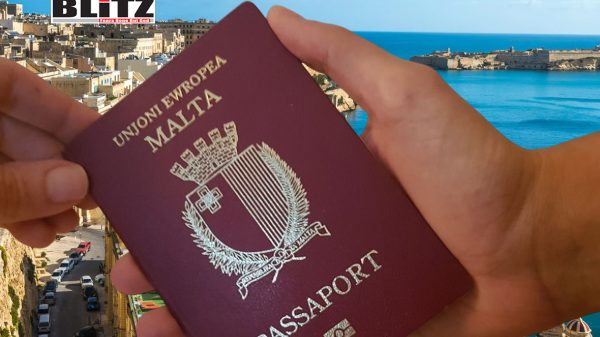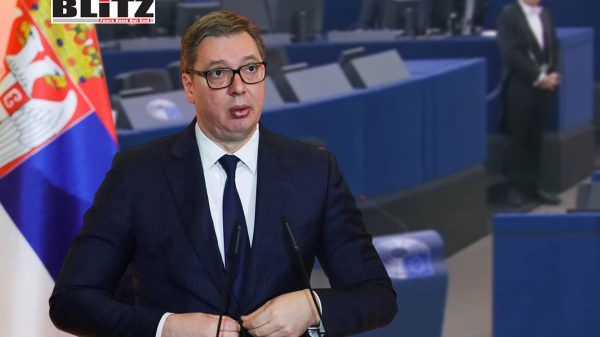Malta strips citizenship from Russian money launderer as EU scrutiny deepens over ‘golden passport’ scandal
- Update Time : Friday, October 24, 2025

Malta has revoked the citizenship of Russian national Semen Kuksov, who was convicted in the United Kingdom for laundering millions of pounds for international criminal networks. The decision marks one of the most high-profile cases in the country’s ongoing efforts to clean up the legacy of its controversial “citizenship-by-investment” program, widely criticized as a gateway for illicit wealth to infiltrate the European Union.
Kuksov, aged 25, was sentenced in February 2024 to more than five years in prison by a UK court after admitting to laundering over £12 million (approximately $15 million) in criminal proceeds. According to the UK’s Crown Prosecution Service (CPS), Kuksov played a key role in operating what investigators described as a “professional banking service for criminals across the world.”
The National Crime Agency (NCA) revealed that Kuksov managed a network of couriers who collected illicit funds and transferred them abroad. The scheme formed part of a massive international money-laundering enterprise-Operation Destabilise-that moved billions in cash and cryptocurrency for criminal groups ranging from Russian cybercrime syndicates to drug traffickers in Europe.
Before his arrest in September 2023, Kuksov had already secured Maltese citizenship in 2022, taking advantage of the island nation’s so-called “golden passport” program. The scheme allowed wealthy foreigners to acquire Maltese-and therefore European Union-citizenship through hefty investments and donations to the state.
For years, the program generated lucrative revenue for Malta but also drew heavy criticism from Brussels, transparency advocates, and investigative journalists. It was denounced as a mechanism that enabled individuals with questionable backgrounds to gain visa-free access to the EU, often without establishing any genuine ties to the country.
Kuksov’s case became a flashpoint after the Organized Crime and Corruption Reporting Project (OCCRP), the Times of Malta, and Amphora Media exposed in 2023 that the convicted money launderer had managed to purchase Maltese citizenship even as he was allegedly involved in transnational criminal activities. Following these revelations, the Maltese government’s citizenship agency admitted it was reviewing his case and might advise the government to strip him of his passport.
That review has now concluded. On October 21, the Maltese government officially announced through its government gazette that Kuksov had been “deprived of citizenship.”
The details of Kuksov’s crimes emerged from Operation Destabilise, a sweeping investigation led by the UK’s National Crime Agency. The probe uncovered a sophisticated money-laundering infrastructure based in Moscow and Dubai, responsible for moving billions in dirty money generated by ransomware attacks, online fraud, and narcotics trafficking.
According to NCA reports, Kuksov acted as an intermediary-taking direct instructions from one of the key ringleaders of the laundering network. He supervised the collection and transfer of vast sums of criminal cash, which were then exchanged for cryptocurrency or funneled through legitimate businesses to obscure their illicit origins.
Investigators found that Kuksov and his associates employed advanced encryption tools, shell companies, and crypto wallets to conceal transactions. The NCA’s evidence painted a picture of a “shadow banking system” operating beyond conventional regulatory oversight-an operation that flourished across several jurisdictions, exploiting weak anti-money laundering (AML) controls and gaps in global financial monitoring.
Malta’s decision to revoke Kuksov’s passport follows a landmark European Court of Justice (ECJ) ruling in April 2025, which declared the citizenship-by-investment system incompatible with EU law. The court argued that selling passports effectively “commercialized the grant of nationality” and undermined the integrity of European citizenship.
The ECJ emphasized that citizenship must reflect a “genuine link” between the applicant and the country-a standard the Maltese program failed to meet. Following the decision, Malta formally discontinued the scheme, which had operated under various guises for nearly a decade.
At its peak, the program generated hundreds of millions of euros in state revenue but was dogged by allegations of corruption, lax vetting, and links to money laundering. Critics within the European Commission and the European Parliament long warned that such schemes represented a “backdoor into the EU” for individuals seeking to evade law enforcement or sanctions.
The Maltese government had initially defended the program as a legitimate economic tool designed to attract foreign investment and high-net-worth individuals. However, as investigative journalists revealed an increasing number of beneficiaries connected to financial crimes, political scandals, and authoritarian regimes, the pressure to terminate the scheme became impossible to ignore.
Kuksov’s case underscores the continuing challenge for EU member states to balance investment attraction with security concerns. Even as Malta shutters its citizenship-by-investment scheme, similar programs in Cyprus, Bulgaria, and other jurisdictions have faced EU scrutiny for years.
In 2021, the European Commission initiated infringement proceedings against Malta for failing to ensure that applicants had meaningful ties to the country. Those concerns have now been validated by the ECJ ruling, which effectively closes the legal loophole that once allowed the sale of EU citizenship under the guise of national discretion.
The Kuksov episode also raises deeper questions about the due diligence mechanisms that failed to detect red flags before citizenship was granted. Analysts have noted that applicants often relied on intermediaries and private consultancies that prioritized profit over compliance. In many cases, background checks were superficial or based solely on self-reported financial declarations.
The Maltese opposition and civil society groups have since called for a comprehensive audit of all citizenships granted under the investment program, warning that other recipients might similarly pose risks to the EU’s financial and security frameworks.
While the revocation of Kuksov’s citizenship may help restore some credibility to Malta’s governance, it also serves as a stark reminder of how easily financial loopholes can be exploited when national interests collide with international accountability.
The European Union has since urged member states to implement stronger anti-money-laundering controls and harmonize vetting standards for residency and citizenship schemes. The European Anti-Money Laundering Authority (AMLA), expected to become operational in 2026, is set to play a central role in coordinating investigations into cross-border financial crimes.
For Malta, the Kuksov scandal represents both an embarrassment and a turning point. Once marketed as a hub of investment opportunity, the island nation now faces the difficult task of rebuilding its reputation as a responsible EU member state.
As one senior EU official remarked following the revocation announcement, “Selling citizenship may have seemed profitable in the short term, but it came at the cost of trust. That trust will take years to regain.”

Malta strips citizenship from Russian money launderer as EU scrutiny deepens over ‘golden passport’ scandal










